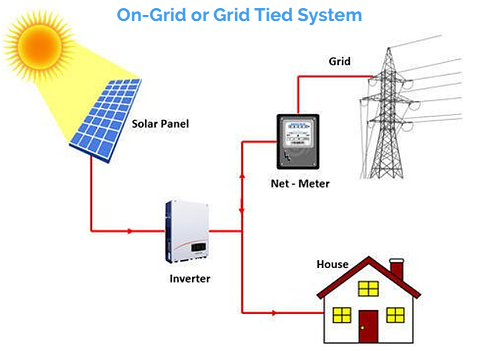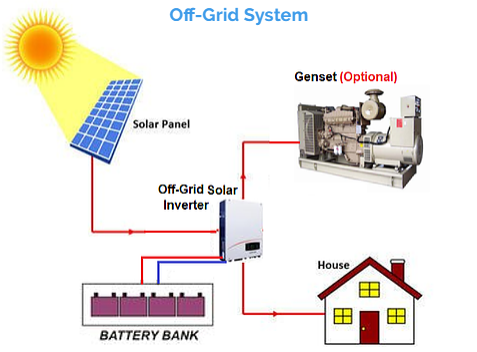Which system is best for you?
Broadly, Solar power setups can be deployed in three different configurations, such as :
On-Grid System
Also called Grid Tied system comprises of Solar Panels put up on building roof/open areas like parking etc. and a solar power inverter. This type of setup is suitable for areas where Grid electricity supply is stable with minimal or no outages. Electricity generated by this system is fed to the house and any surplus electricity is fed back to Grid power lines (via a bidirectional Net meter). Amount of surplus units fed to grid can be used back during night time or during cloudy days.
This setup is quick to deploy and requires zero or minimal maintenance (only requires water jet cleaning of panels once in 2-3 months). It is the most cost effective option among all three.
However please note that in the event of grid power outage this system shuts off and can not power the house. (This is as per state electricity policy)

Suitable For: On Grid / Grid Tied solar setups are best for areas where Grid electricity supply is stable with minimal or no outages.
Pros: Low on Cost & Maintenance.
Cons: Can not generate electricity during Grid failures
Hybrid System
A Hybrid system comprises of Solar Panels, a solar power inverter and a battery bank to provide power even during power outages in day or at night. Electricity generated by this system is used to charge batteries and feed the house electrical appliances. Any surplus electricity generated is fed back to Grid power line (via a bidirectional Net meter). Amount of surplus units fed to grid can be used back during night time or during cloudy days.
This type of setup is suitable for areas where Grid electricity supply is NOT stable and suffers from recurring outages. You can think of this system like a combination/hybrid of Battery inverter and Solar power equipment that is also capable of exporting surplus generated electricity into the grid.

Suitable For: Hybrid solar setups are best for areas which suffers from frequent power cuts and fluctuations means where Grid electricity supply is NOT stable
Pros: Biggest advantage of Hybrid system is that it will continue to generate electricity even during power cuts.
Cons: High on Cost & Maintenance. As Batteries require frequent electrolyte top up and replacement every 5-7 years.
Off-Grid System
As the name suggests, an Off-Grid solar power system is suitable for Remote Farm houses, vacation homes, village cottages etc. which have little or no Grid power supply at all. It comprises of Solar Panels , solar power inverter and battery bank.
This type of Solar power generation system is seen as a Green alternative to Diesel Gensets which are otherwise used to power up remote off-grid habitats.
System uses solar power to generate electricity, charge batteries and run house appliances using solar power during day and using batteries during night or cloudy days.
In this system there is provision available to charge batteries using Grid or genset however this system can not export surplus electricity back into the grid.

Suitable For: Off-Grid solar power system is suitable for areas which have little or no Grid supply at all.
Pros: Completely independent, works without Grid supply.
Cons: Very High on Cost & Maintenance (among three setups,) . Lack of grid supply means system requires more solar panels & larger battery bank to generate and store power for night long operations. Also Batteries require frequent electrolyte top up and replacement every 5-7 years. This system can not export surplus power into grid.
